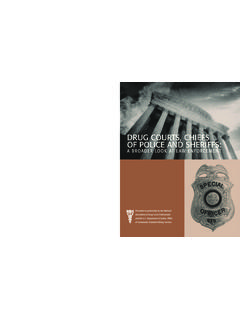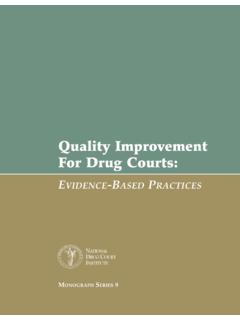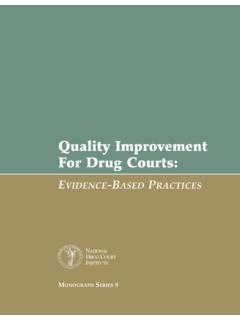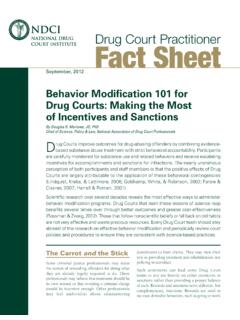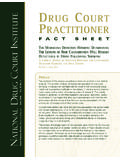Transcription of Drug Court Case Management - NDCI.org
1 NATIONAL. drug Court . INSTITUTE. drug Court case Management ROLE , FUNCTION , AND UTILITY. MONOGRAPH SERIES 7. screening assessing planning linking monitoring advocating engaging motivating goal setting guiding referring strengthening facilitating integrating educating preventing responding intervening supporting empowering protecting testing tracking documenting synchronizing reporting rewarding recording multi-tasking programming partnering staffing managing training evaluating coordinating collaborating chronicling sharing re-parenting resourcing structuring supervising i drug Court case Management : Role, Function, and Utility Randy Monchick, , Anna Scheyett , , , , Jane Pfeifer, June 2006.
2 drug Court case Management : Role, Function, and Utility Prepared by the National drug Court Institute, the education, research, and scholarship affiliate of the National Association of drug Court Professionals. Copyright 2006, National drug Court Institute NATIONAL drug Court INSTITUTE. Judge Karen Freeman-Wilson (Ret.), Executive Director C. West Huddleston, III, Director 4900 Seminary Road, Suite 320. Alexandria, VA 22311. Tel. (703) 575-9400. Fax. (703) 575-9402. This document was prepared under Cooperative Agreement Number 2005-DC-BX-K003. from the Bureau of Justice Assistance, Office of Justice Programs, Department of Justice, with the support of the Office of National drug Control Policy, Executive Office of the President.
3 Points of view or opinions in this document are those of the authors and do not necessarily represent the official position of the Department of Justice or the Executive Office of the President. All rights reserved. No part of this publication may be reproduced, stored in a retrieval system, or transmitted, in any form or by any means, electronic, mechanical, photocopying, recording or otherwise, without the prior written permission of the National drug Court Institute. Printed in the United States of America. drug courts perform their duties without manifestation, by word or conduct, of bias or prejudice, including, but not limited to, bias or prejudice based upon race, gender, national origin, disability, age, sexual orientation, language, or socioeconomic status.
4 Ii drug Court case Management : Monograph Series 7. National drug Court Institute ACKNOWLEDGEMENTS. The National drug Court Institute (NDCI) is grateful to the Office of National drug Control Policy (ONDCP) of the Executive Office of the President and the Bureau of Justice Assistance (BJA) at the Office of Justice Programs, Department of Justice for the support that made this publication possible. We wish to thank all the members of the case Management committee for their hard work and perseverance as well as the ONDCP, whose insights about the importance of case Management to the operation and refinement of drug courts was backed up with the seed money for this project.
5 Distinctive regards are extended to Hillary Efkeman, Roger Peters, , Richard Rapp, , and Meridith Thanner, who each provided valuable information and insight to this document, and to Judge Bill Meyer (ret.); Douglas B. Marlowe, , ; Robin Kimbrough, ; Kenneth Arnold; Michael Stringer; Jud Phelps, and Elizabeth Peyton, who each offered constructive commentary as peer reviewers. AUTHORS. Randolph Monchick, , Dr. Monchick is a consultant and educator in the development, evaluation and refinement of judicial and substance abuse intervention systems. As a lawyer, college professor and practitioner, he has lectured extensively in the fields of criminology and sociology with special emphasis on the administration of justice, criminal law, juvenile justice, clinical case Management , corrections, counseling, substance abuse intervention strategies, dispute resolution and evaluation research.
6 Having previously served as the drug Treatment Court Administrator for the State of North Carolina and as a federal criminal defense attorney, Dr. Monchick currently serves as the Director of Back on TRAC: Treatment, Responsibility & Accountability on Campus, a national initiative that adapts the drug Court system model to college campuses. Anna Scheyett, , , , , Mrs. Scheyett is a member of the faculty at the University of North Carolina School of Social Work, where she teaches health and mental health courses in the Masters program. Anna received her Master's in Social Work from UNC at Chapel Hill, and also has Masters' in Science and Philosophy from Yale University.
7 She has consulted, published, researched, and trained in the areas of adult mental health and substance abuse services, with particular interest in mental health policy; evidence-based practice; case Management ; consumer empowerment; and recovery, stigma, and knowledge diffusion strategies in education. Jane Pfeifer, Ms. Pfeifer owns her own consulting firm Justice Development & Training, after having worked as a probation officer and then as a Court program manager in northern California. She has worked extensively with private, public, and non-profit agencies and organizations at the local, state, national, and international level on community corrections, case Management , and drug Court projects.
8 Ms. Pfeifer also teaches part-time at California State University-Chico. STAFF. NDCI also wishes to express its gratitude to Alec Christoff, Esq., Carson L. Fox, Esq., Carolyn Hardin, , and Meghan Wheeler, who made invaluable contributions to this document. drug Court case Management : Monograph Series 7 iii National drug Court Institute iv drug Court case Management : Monograph Series 7. National drug Court Institute FOREWORD. The National drug Court Institute (NDCI) is committed to improving drug Court operations by equipping its professionals in best practices, steeped in evidence. That is why this publication is so critical to the expanding drug Court field.
9 While judicial leadership, treatment, and community supervision are generally suggested as being three of the most important components of the drug Court process, case Management has become a key tenet in linking the client to additional services and improving communication across different agencies serving the drug Court population. To amplify the significance of the case Management concept to the drug Court process, NDCI worked with Drs. Andrea Barthwell, and Randy Monchick, , to create standards and a training curriculum to further develop and refine case Management practices in the drug Court setting. This led to the formation of a focus group and committee co-chaired by Drs.
10 Barthwell and Monchick, and composed of the following academicians and practitioners: Francis Brisbane, , ; Alesia Donner; Hillary Efkeman; Mack Jenkins; Mike Loeffler, ; Linda Penner; Roger Peters, ; Jane Pfeiffer, ; Richard Rapp, ; Anna Scheyett, ; Deborah Reilly, , ; M. Susan Ridgely, , ; and Tammy Woodhams. Being in the same room with this committee during their two focus group meetings and watching this incredible set of minds - and vibrant personalities - critically discuss the role and intricacies of team-based case Management in the drug Court setting has to rank as one of the most stimulating experiences in my professional career. The results of the group's work have helped give direction and shape not only to this monograph, but also to the entire drug Court movement.

